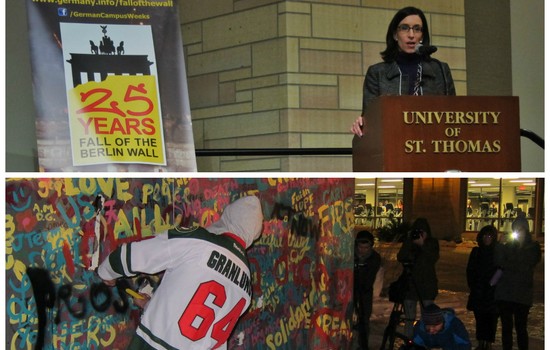News

On the evening of November 13, 2014, representatives of the Hungarian Honorary Consulate in Minnesota attended the reception, celebration and the lecture to mark the 25th Anniversary of the fall of the Berlin Wall which was organized by the German Club at the University of St.Thomas, St.Paul, Minnesota.
Dr.Terence Langan, Dean of College of Arts and Sciences, gave a welcome speech followed by the evening’s guest speaker, Dr. Daniel Hamilton, professor at Johns Hopkins University. The interesting and informative lecture entitled "Walls that fell and walls still to fall: what the fall of the Berlin Wall means today". Dr.Hamilton talked about the Berlin Wall - how it was cracked twenty-five years ago, dissolving the Iron Curtain and transforming the world.

The Berlin Wall no longer exists, but other walls still exist in today’s world, and new walls are still being built. The physical wall came down in Berlin, but there are still intangible and invisible walls in minds and hearts that are much harder to tear down.

Timea Takacs with Dr.Suzanne M.Wagner, Department of Modern and Classical Languages, St.Thomas University, St.Paul, Minnesota
The East German regime started to falter in May 1989, when removal of Hungary's border fence opened a hole in the Iron Curtain. It caused an exodus of thousands of East Germans fleeing to West Germany and Austria via Hungary. The Peaceful Revolution, a series of protests by East Germans, led to the fall of the Berlin Wall and GDR's first free elections on March 18, 1990.
Thank you to Dr. Suzanne Wagner for inviting the Hungarian Honorary Consulate to this event. We were happy to commemorate and celebrate the Fall of the Iron Curtain with you, your students and the members of the German Club.
Watch/Listen the lecture (video): UST Celebrates the 25th Anniversary of the Fall of the Berlin Wall
Film produced by the Victims of Communism Memorial Foundation: 1989 Year of Miracles
*Daniel S. Hamilton is an award-winning author, media commentator, US diplomat, and the Director of the Center for Transatlantic Relations at the Johns Hopkins University School of Advanced International Studies (SAIS)


